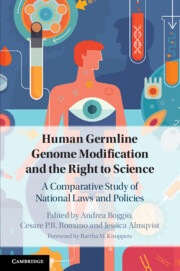 Human Germline Genome Modification and the Right to Science
Human Germline Genome Modification and the Right to Science from Part V - Conclusions
Published online by Cambridge University Press: 15 November 2019
In the conclusions, the book editors assess the existing national and international regulatory frameworks in the light of the five foundational principles that they identified by reading international bioethics law in conjunction with international human rights standards: (i) freedom of research; (ii) benefit sharing; (iii) solidarity; (iv) respect for dignity; and (v) the obligation to respect and to protect the rights and individual freedoms of others. Their analysis reveals four issues common to most national regulatory frameworks as well as the international framework: (i) The prohibition to create embryos for research embryos cannot be reconciled with the right to science and the rights of science; (ii) limitations to scientific freedom based on vague laws are not truly limitations “determined by law”; (iii) limitations to scientific freedom based on obsolete laws are not limitations accepted in a “democratic society”; (iv) ne plus ultra prohibitions breach the right of everyone to benefit from scientific and technological progress and the principle of benefit sharing. The editors conclude by sketching an international governance framework that promotes science and technological development while being mindful and respectful of international human rights standards, as well as the different sensitivities with which citizens from different parts of the world approach the question of human germline genome modification.
To save this book to your Kindle, first ensure [email protected] is added to your Approved Personal Document E-mail List under your Personal Document Settings on the Manage Your Content and Devices page of your Amazon account. Then enter the ‘name’ part of your Kindle email address below. Find out more about saving to your Kindle.
Note you can select to save to either the @free.kindle.com or @kindle.com variations. ‘@free.kindle.com’ emails are free but can only be saved to your device when it is connected to wi-fi. ‘@kindle.com’ emails can be delivered even when you are not connected to wi-fi, but note that service fees apply.
Find out more about the Kindle Personal Document Service.
To save content items to your account, please confirm that you agree to abide by our usage policies. If this is the first time you use this feature, you will be asked to authorise Cambridge Core to connect with your account. Find out more about saving content to Dropbox.
To save content items to your account, please confirm that you agree to abide by our usage policies. If this is the first time you use this feature, you will be asked to authorise Cambridge Core to connect with your account. Find out more about saving content to Google Drive.